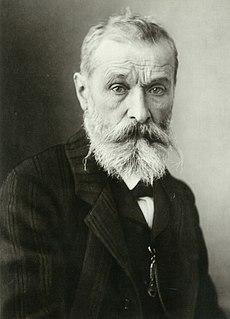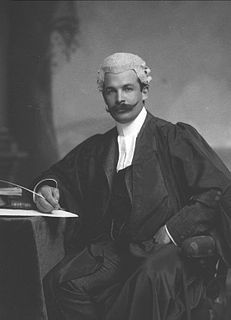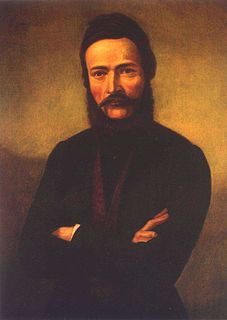
Ľudovít Velislav Štúr, known in his era as Ludevít Štúr, was the leader of the Slovak national revival in the 19th century, and the author of the Slovak language standard, eventually leading to the contemporary Slovak literary language. Štúr was an organizer of the Slovak volunteer campaigns during the Hungarian Revolution of 1848. He was also a politician, poet, journalist, publisher, teacher, philosopher, linguist and member of the Hungarian Parliament.

Máté Csák or Matthew III Csák, also Máté Csák of Trencsén was a Hungarian oligarch who ruled de facto independently the north-western counties of Medieval Hungary. He held the offices of master of the horse (főlovászmester) (1293–1296), palatine (nádor) and master of the treasury (tárnokmester) (1309–1311). He could maintain his rule over his territories even after his defeat at the Battle of Rozgony against King Charles I of Hungary. In the 19th century, he was often described as a symbol of the struggle for independence in both the Hungarian and Slovak literatures.
The Slovak National Council was an organisation that was constituted at various times in the 19th and 20th centuries to act as the highest representative of the Slovak nation. It originated in the mid-19th century as a focus for Slovak nationalist aspirations to break away from the Kingdom of Hungary but its bid for independence was suppressed. The second SNR was more successful, issuing a celebrated declaration of Slovakian independence in 1918, though it too was ultimately dissolved by the state after Czechoslovakia was formed. The third SNR coordinated Slovak resistance to the Nazis and their Slovak puppet government, and evolved into a Communist-controlled organ of state power after the Second World War. Following the 1989 Velvet Revolution it was transformed into the new democratically elected Slovak parliament. A number of mostly short-lived and not particularly influential Slovak National Councils were also proclaimed abroad between the 1920s and 1940s, the last one seeking to mobilise Slovak émigré resistance to Communist rule.

Svetozar Miletić was an advocate, journalist, author, politician, mayor of Novi Sad, and the political leader of Serbs in Vojvodina.
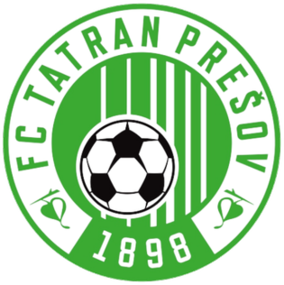
1. FC Tatran Prešov is a Slovak football club based in the city of Prešov. Tatran Prešov is the oldest football team in Slovakia, founded on 25 May 1898. The club currently participates in the 2. liga. The "Green and Whites" played 32 seasons in the Czechoslovak top division. Tatran became the dark horse of Czechoslovak football in the 1960s and 1970s, but never won a title. The greatest league success was the first place in Champions league 1999 and 2000 seasons. The club also came close in the Czechoslovak Cup, losing twice in 1966 and 1992 finals.
The Slovak National Party was a Slovak conservative and nationalist political party in the Kingdom of Hungary and then in Czechoslovakia from 1871 to 1938. The post-Velvet Revolution party with the same name sees the historical one as its ideological predecessor.
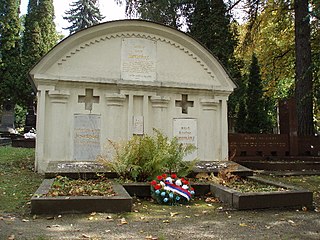
The National Cemetery in Martin, Slovakia is the final resting place of many important personalities of Slovak history. The list includes writers, poets, national activists, pedagogues, etc.
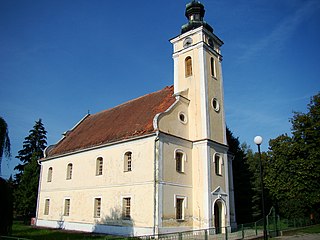
Hlboké, is a village and municipality in Senica District in the Trnava Region of western Slovakia.

Jozef Miloslav Hurban, pseudonyms Slavomil F. Kořennatý, Ľudovít Pavlovič, M. z Bohuslavíc, M. Selovský, was a leader of the Slovak National Council and the Slovak Uprising in 1848/1849, a Slovak writer, journalist, politician, organizer of Slovak cultural life and a Protestant priest. He first supported Ján Kollár, but later turned to Ľudovít Štúr. His son Svetozár Hurban-Vajanský followed his father's footsteps both as a writer and nationalist.
Dušan Jurkovič was a Slovak architect, ethnographer and artist. One of the best-known promoters of Slovak art in 20th century Czechoslovakia, he is remembered mostly due to his projects of numerous World War I cemeteries in Galicia. Jurkovič repeatedly stressed: The work of art is rooted in the time. I also have always cautiously listened to its voice."

Michal Miloslav Hodža was a Slovak national revivalist, Protestant priest, poet, linguist, and representative of the Slovak national movement in 1840s as a member of "the trinity" Štúr-Hurban-Hodža. Michal Miloslav Hodža is also the uncle of the Czechoslovak politician Milan Hodža.

The Slovak Uprising , Slovak Volunteer Campaigns or Slovak Revolt was an uprising of Slovaks against the Hungarian rule in Western parts of Upper Hungary, within the 1848–49 revolutions in the Habsburg Monarchy. It lasted from September 1848 to November 1849.
Juraj Košút was a Hungarian nobleman, a lawyer and a supporter of the Slovak national movement.
Slzy a úsmevy, Op.25 is a 1909 song cycle on Slovak poetry by Slovak composer Mikuláš Schneider-Trnavský. It is among his best known vocal compositions. The songs were first published in 1912.

Ján Samuel Francisci-Rimavský, was a Slovak poet, novelist, translator, journalist and politician, who collaborated with the nationalist leader, Ľudovít Štúr. He used numerous pseudonyms, including Janko Francisci, Janko Rimavský, Slavoľub and Vratislav Rimavský.
The Demands of the Slovak Nation was a manifesto issued by Slovak nationalists during the revolutions of 1848 in the Habsburg areas. It was prompted by the nationalists' realisation that the Hungarian government would not heed the calls of Ľudovít Štúr for the establishment of public regional assemblies and the acceptance of a Slovak petition at a national assembly.
Slovenské pohľady or Slovak views was a literary magazine published in 1846, 1847, 1851 and 1852. It was relaunched in 1881, and has been published continuously to the present.
